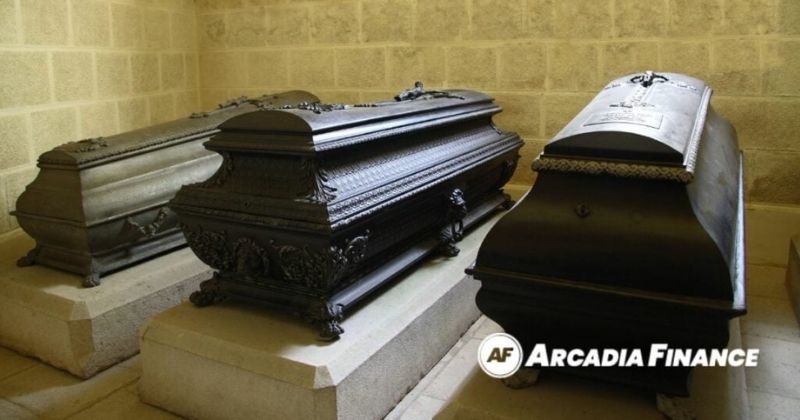
In the rainbow nation of South Africa, where diverse cultures intertwine and legacies stand tall, life’s final passage is marked with poignant ceremonies and rituals. At the heart of these ceremonies often lies a tangible vessel, the coffin. For families, choosing the right coffin isn’t merely about fulfilling a necessity. It’s a deeply personal, emotion-laden decision, influenced by tradition, values, and financial considerations. What’s equally enthralling is how South Africa’s rich tapestry of cultures bestows upon funerals a unique character, making them more than mere rites of passage.
Key Takeaways
- Regional variations significantly influence coffin prices.
- The rise of digital platforms offers transparent pricing and customer reviews.
- Eco-friendly options are gaining traction, reshaping funeral industry standards.
- It’s essential to balance cost, quality, and sentiment when selecting a coffin.
About Arcadia Finance
Secure your loan with ease via Arcadia Finance. No application charges, and choose from 19 reputable lenders, all compliant with South Africa’s National Credit Regulator standards.
Historical Perspective
South Africa’s burial customs have evolved significantly over time, presenting a rich tapestry of historical and cultural shifts. Initially rooted in indigenous practices, burials prominently featured natural symbols with the deceased often wrapped in animal hides, signifying unity with nature. Colonisation introduced European-influenced coffin designs, yet these designs soon incorporated local artistry, symbolising a union of different worlds. Modernisation and urbanisation in later years prompted changes in burial preferences, with cremation gaining prominence due to space constraints. Additionally, as societal dynamics shifted and global influences increased, coffins began to serve as expressions of personal identity and status. Today, the choices in coffin design and burial practices are not just about tradition but reflect South Africa’s broader historical journey and its multifaceted identity.
Types of Coffins
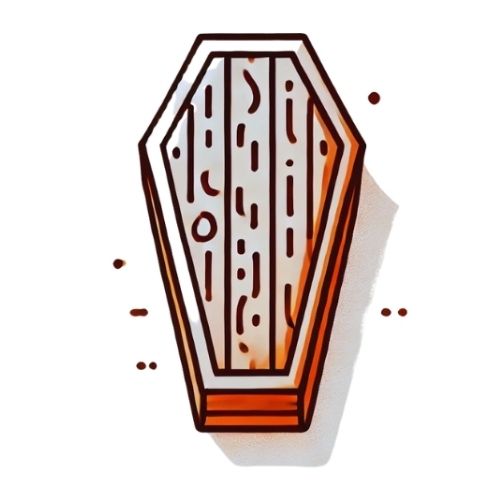
Traditional Wooden Coffins
The essence of classic and timeless elegance, these coffins are reminiscent of South Africa’s long-standing burial customs. Crafted from woods like oak, mahogany, and pine, they’re not just boxes but works of art. Their earthy tones, grainy textures, and sometimes intricate carvings stand as a testament to the nation’s rootedness in tradition while offering a dignified resting place.
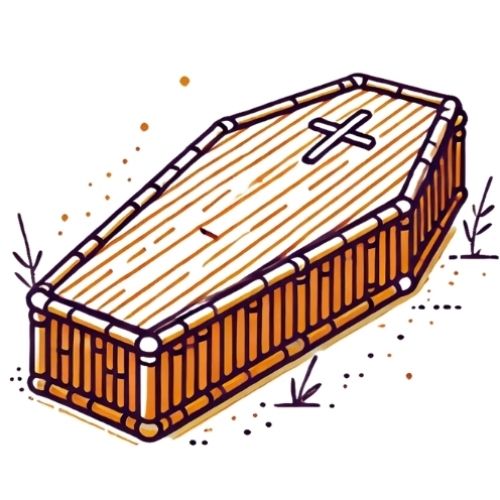
Eco-friendly Coffins
As global conversations shift towards sustainability, South Africa isn’t far behind. The rise of eco-friendly coffins, made from biodegradable materials like bamboo, wicker, or even recycled paper, resonates with a society increasingly attuned to its environmental footprint. These coffins, light in weight but strong in sentiment, represent a confluence of respect – both for the departed and for Mother Earth.
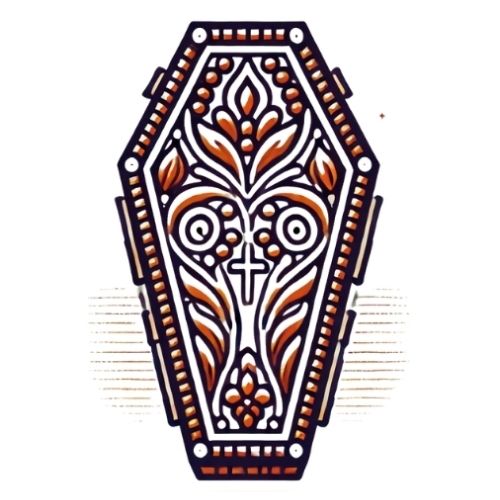
Custom-designed and Luxury Coffins
Gone are the days when coffins were mere wooden boxes. Today’s South Africans, with their flair for individuality and an eye for detail, often lean towards custom designs. These range from coffins painted with personal artworks to those adorned with luxury fittings. It’s not just about the final resting place anymore; it’s about encapsulating an entire life’s essence, passions, and even quirks.
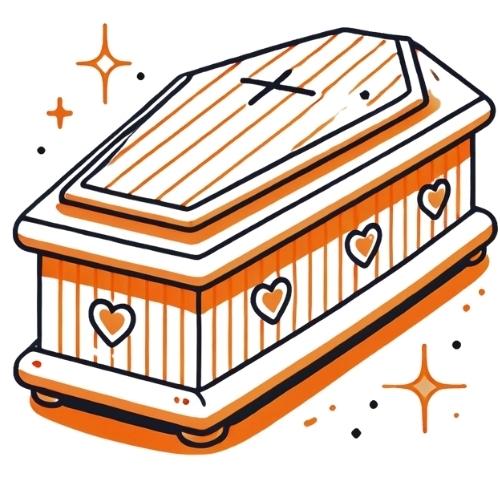
Children’s Coffins
The loss of a young life is heart-wrenching, and the choice of a coffin for a child is drenched in profound emotion. South Africa’s craftsmen, recognizing the delicate nature of this, have crafted children’s coffins with extra care and tenderness. Often smaller in size and adorned with gentle motifs, these coffins aim to offer a soft embrace, a cocoon of love, for the little souls.
Curious about what happens to unpaid debts when someone passes away? Many people assume that debts are automatically forgiven, but is that really the case?
Factors Affecting Coffin Prices
As we navigate the world of coffin prices in South Africa, it’s crucial to understand that these prices aren’t plucked from thin air. They’re the culmination of various factors, each interplaying to give a final price tag. Just as one wouldn’t buy a home without understanding its valuation, the same diligence is required while choosing this final resting place. Let’s delve into the driving forces behind coffin prices.
Material Used
At the heart of any coffin lies its material, serving as both its backbone and aesthetic essence. South Africa offers a range of materials, from classic woods like **mahogany and teak** to more contemporary choices like bamboo or recycled cardboard. Naturally, a solid oak coffin, with its luxurious grain and durability, comes with a higher price tag than one made of compressed wood or cardboard. Similarly, metal coffins, often lauded for their longevity, also lean towards the pricier end. In essence, the material doesn’t just dictate the coffin’s look and feel, but also significantly influences its cost.
Craftsmanship
The hands that craft a coffin add layers of value to it. In one corner, we have handmade coffins, meticulously crafted by artisans who infuse each piece with a touch of personal care, ensuring that every curve, every joint, every detail is perfect. This precision and artistry come at a premium. On the other hand, factory-made coffins, produced in bulk, might not have the artisanal touch but offer efficiency, consistency, and often, a more budget-friendly option for families.
Customizations and Add-ons
In an era where personalization is key, many choose to immortalize their loved ones’ personalities or passions on their coffins. This could range from a hand-painted portrait, an engraved quote, or even a specific design motif. Additionally, luxury fittings, plush interiors, or tech add-ons like built-in memorial screens can elevate a coffin from simple to sophisticated. But with these bespoke touches comes an incremental cost. It’s not just about purchasing a coffin; it’s about curating a memoir, and this customization often reflects in the final price.
» Find out more: about tombstone prices in South Africa
Regional Variations in Prices
When scouring the vast landscapes of South Africa for coffin prices, one realises that geography plays a notable role. South Africa, with its eclectic blend of urban hubs and bucolic retreats, exhibits a distinct variance in coffin prices based on location.
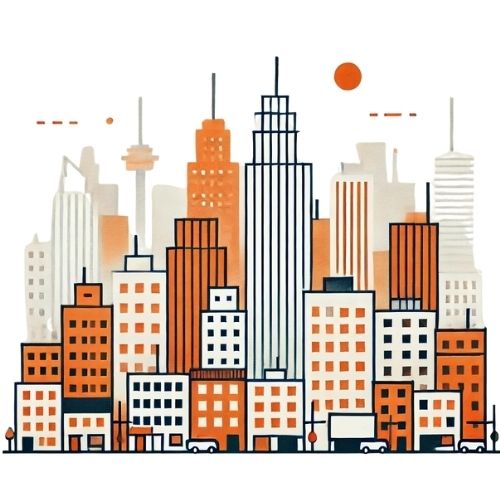
Major Cities vs. Rural Areas
Johannesburg, Cape Town, Durban, and other urban giants naturally witness a surge in demand due to dense populations. This demand, paired with the cities’ penchant for modernity, often results in a wider range of coffin options, from the simplistic to the avant-garde. Yet, this abundance of choice and the urban premium of living costs can inflate prices when compared to the tranquil countryside. In contrast, rural areas, while offering fewer choices, often have coffins priced more modestly. The reason? Lower operational costs, lesser competition, and a community-driven approach to crafting and selling.

Provincial Differences
Just as KwaZulu-Natal revels in its unique vibe distinct from that of the Western Cape, their coffin markets also differ. Various provinces, with their economic climates, cultural nuances, and supply chain dynamics, inevitably showcase distinct pricing structures. For instance, areas richer in timber resources might offer wooden coffins at more competitive prices than regions where such materials are scarce.
Dealing with the practical aspects of loss includes ensuring that your estate is managed as you intended. Our guide on the steps to organize your finances in the event of a loss offers vital insights into estate planning, wills, and how to secure your family’s financial future.
Environmental Concerns and Choices
In the age of climate crises and environmental awakenings, the realm of last rites isn’t insulated from the call of the Earth. And South Africa, in its characteristic manner, is answering this call with vigour.
Biodegradable Coffins
Championing the cause of the planet even in passing, biodegradable coffins have become the talk of the town. Crafted meticulously using materials like bamboo, jute, or even organic cotton, these coffins offer an embrace to the departed while ensuring they tread lightly on the Earth. In terms of pricing, while they are often more affordable than their opulent wooden or metal counterparts, availability can sometimes be a hitch. Limited largely to urban centres or areas with a pronounced environmental consciousness, these eco-friendly alternatives might come at a slight premium due to their niche appeal.
Cremation Urns
With space becoming a luxury and environmental concerns on the rise, cremation is increasingly becoming a preferred choice for many South Africans. Naturally, this has given rise to a market for cremation urns. When juxtaposed against traditional coffins, urns, owing to their smaller size and often simpler design, are generally more wallet-friendly. However, much like coffins, the prices can vary based on material, design intricacies, and customisations.
Cultural Influence on Coffin Selection
South Africa, known as the ‘Rainbow Nation’, presents a diverse cultural blend evident in various societal aspects, including funeral customs. Traditional African burial practices prioritise not only the physical but also the spiritual significance of coffins, with choices often being influenced by ancestral reverence and spiritual symbolism. On the other hand, the country’s various communities, ranging from the Indian diaspora in KwaZulu-Natal, the Afrikaans speakers, to European descendants, have integrated their unique cultural touches. This results in a spectrum of coffin designs, from those featuring Christian crosses to minimalistic European designs or vibrant patterns inspired by Indian aesthetics.
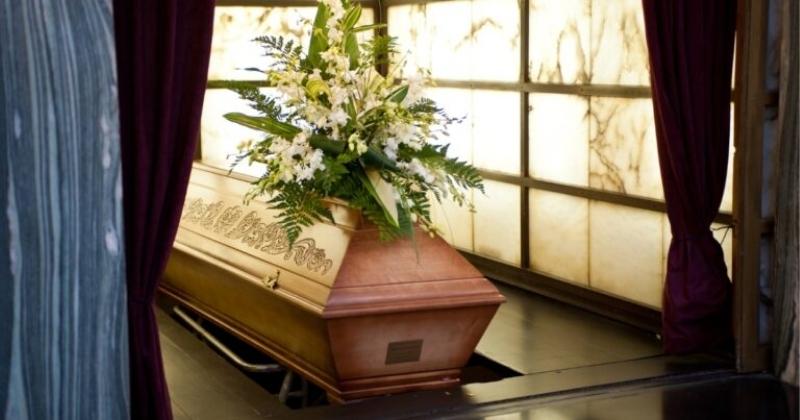
Modern Trends and Innovations
Times are changing, and so are coffins. With the flux of technology and an amplified voice for personal expression, the traditional coffin is undergoing a transformation.
The Rise of Personalised Coffins
In an era of Instagram and personal brands, the need to celebrate individuality doesn’t end with life. Modern South Africans are veering towards coffins that encapsulate life stories, passions, or even humour. From coffins painted with scenic landscapes for the traveller at heart, to those emblazoned with musical notes for the eternal musician, personalisation is becoming the new norm. It’s no longer about resting in peace but about resting in personality.
Technology-infused Coffins
Tech isn’t just for the living. The digital age is seeping into the afterlife, with coffins coming equipped with QR codes that, when scanned, showcase a digital memorial of the deceased. Some even feature built-in screens displaying slideshows or videos. These tech-savvy additions, while redefining memorial services, also impact the overall cost of the coffin, often positioning them at a premium.
Financing and Payment Plans
In an age where financial flexibility is a sought-after luxury, planning for one’s departure from the world isn’t left untouched. The South African funeral industry, understanding the financial burdens a funeral can impose, has introduced mechanisms to ease the monetary strain.
Funeral Insurance and Its Role
Much like how insurance cushions unforeseen medical bills or car repairs, funeral insurance has taken root in South Africa. It’s a simple premise: monthly premiums in exchange for a cover that manages funeral expenses, including the coffin. This allows families to focus on the emotional journey of saying goodbye rather than the financial implications. Having a financial buffer ensures that the deceased’s wishes, in terms of coffin type or design, are met without compromise.
Payment Plans Offered by Funeral Parlours
Funeral parlours, increasingly in tune with the financial challenges many face, now offer structured payment plans. This means, instead of a hefty lump sum, families can opt to pay for the coffin in installments. Some parlours even provide interest-free periods, making the process even more accommodating.
How to Apply for a Loan with Arcadia Finance
Applying for a loan at Arcadia Finance is straightforward and accessible. Start your application by visiting our website, where our dedicated and experienced team is available to assist you with any inquiries you might have throughout the process. We will require some basic information from you, including details about your income and expenses, as well as your desired loan amount and preferred repayment term. After submitting your application, our team will promptly review the details and respond with a decision as soon as possible.
Import vs. Local Production
As globalisation shrinks the world, the choice between locally crafted coffins and imported ones has become significant in South Africa.
Costs Associated with Importing
Imported coffins, especially from countries known for their woodworking prowess or unique designs, can carry a certain allure. However, this often comes with a higher price tag. Beyond the base cost, there are additional expenses like customs duties, shipping, and potential delays, all contributing to an elevated price.
Benefits of Supporting Local Craftsmen
On the flip side, opting for local production means investing in the community. It’s not merely about acquiring a coffin; it’s about upholding a legacy of craftsmanship, sustaining local jobs, and preserving the unique artistic expressions that are intrinsically South African. Additionally, going local often translates to faster delivery times and a personal touch, with craftsmen understanding the cultural and regional nuances of their clientele.
DIY Coffins
For some, the act of crafting a coffin becomes a deeply personal and therapeutic experience, leading to the rising trend of DIY coffins.
Cost-Benefit Analysis
At face value, DIY coffins might seem like an economical choice. Raw materials, after all, are often cheaper than finished products. However, when factoring in the tools required, the potential need for skilled guidance, and the value of one’s time, the cost advantage might diminish. Still, for many, the emotional value and personalization a DIY coffin offers make the endeavor priceless.
Resources and Challenges
Today, several workshops and online resources guide DIY enthusiasts through the coffin-making process. But challenges abound. From sourcing the right timber to mastering joinery techniques and ensuring the coffin’s structural integrity, it’s a journey that demands patience, skill, and a genuine passion for craftsmanship.
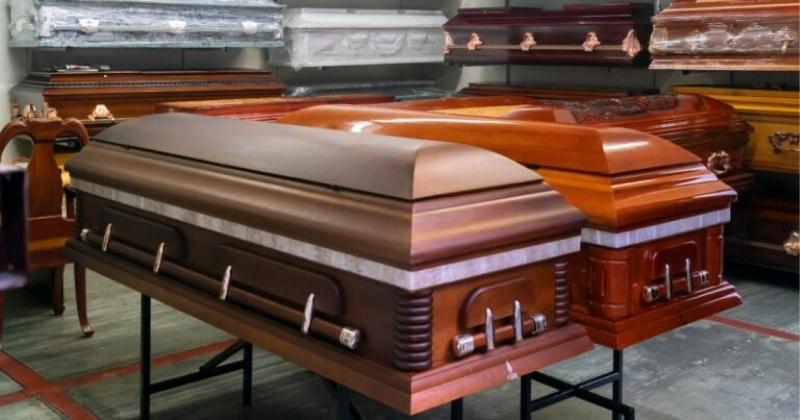
Comparison Overview of Coffin Prices in South Africa
Understanding the cost of coffins in South Africa involves considering various factors such as material, region, customisation options, and the specific funeral home. Below are comprehensive tables that detail these aspects to help you make an informed decision.
Comparison of Coffin Types
Different types of coffins come with varying features and price points. The following table compares the key features and average prices of various coffin types.
| Coffin Type | Material | Average Price (ZAR) | Key Features |
|---|---|---|---|
| Traditional | Wood | R4,000 – R15,000 | Classic design, biodegradable |
| Eco-friendly | Bamboo | R2,500 – R12,000 | Sustainable, natural appearance |
| Budget | Cardboard | R1,000 – R5,000 | Cost-effective, simple |
| Premium | Metal | R8,000 – R25,000 | Durable, often with added features |
| Custom | Mixed | R5,000 – R20,000 | Personalised designs and features |
Price Range by Funeral Home
The price range for coffins can vary widely among different funeral homes. Here is a comparison of basic, standard, and premium coffin prices at various funeral homes in South Africa.
| Funeral Home | Basic Coffin (ZAR) | Standard Coffin (ZAR) | Premium Coffin (ZAR) | Notable Features |
|---|---|---|---|---|
| Doves | R700 – R5,000 | R5,000 – R15,000 | Up to R50,000 | Wide range of custom options |
| Tshipi Noto | R1,000 – R4,000 | R4,000 – R10,000 | Up to R30,000 | Eco-friendly options |
| Icebolethu Funerals | R1,500 – R6,000 | R6,000 – R12,000 | Up to R40,000 | High-quality craftsmanship |
| Thom Kight & Co | R1,200 – R5,000 | R5,000 – R13,000 | Up to R35,000 | Competitive pricing |
| AVBOB | R1,000 – R3,500 | R3,500 – R10,000 | Up to R45,000 | Extensive range of services |
Coffin Prices by Region
Coffin prices can also vary depending on the region. Below is a table showing the average prices in different regions of South Africa and some notable providers.
| Region | Average Price (ZAR) | Notable Providers |
|---|---|---|
| Gauteng | R3,500 – R25,000 | Doves, Tshipi Noto Funeral Home, Thom Kight & Co |
| Western Cape | R3,000 – R22,000 | Doves, Martin’s Funerals, AVBOB |
| KwaZulu-Natal | R2,800 – R20,000 | Icebolethu Funerals, Doves, AVBOB |
| Eastern Cape | R2,500 – R18,000 | Tshipi Noto Funeral Home, Vuyo Funeral Services |
| Free State | R3,000 – R19,000 | Tshipi Noto Funeral Home, AVBOB |
Customisation Options and Additional Costs
Customisation options can significantly influence the cost of a coffin. This table provides an overview of various customisation options and their associated costs.
| Customisation Option | Additional Cost (ZAR) | Description |
|---|---|---|
| Interior Lining | R500 – R3,000 | Silk, satin, or velvet options |
| Engraving | R800 – R4,000 | Personalised messages or designs |
| Handles | R300 – R2,000 | Various materials and styles |
| Decorative Trim | R600 – R3,500 | Gold, silver, or wood trims |
| Custom Size | R1,000 – R5,000 | Non-standard dimensions |
These tables should provide a thorough understanding of the factors that influence coffin prices in South Africa, helping you make a well-informed decision.
Conclusion
When faced with the somber task of selecting a coffin, the weight of the decision stretches beyond mere aesthetics and price points. Being informed and prepared not only eases the financial strain but also aids in making choices that align with one’s values and sentiments. As we delve deep into this discussion, it becomes evident that while the material cost is tangible, the symbolic value of a coffin – encapsulating love, respect, and memory – is immeasurable. It serves as a poignant reminder that in moments of grief and remembrance, understanding and compassion are paramount.
Frequently Asked Questions
Coffin prices vary due to factors like material, craftsmanship, customisations, regional differences, and whether it’s locally produced or imported.
Eco-friendly coffins can sometimes be pricier due to sustainable materials and processes involved, but prices are becoming more competitive as demand grows.
The average cost can range widely based on the factors mentioned earlier. It’s best to research current prices or consult with local funeral homes.
Researching prices online, reading reviews, seeking recommendations, and comparing quotes from different providers can provide clarity.
Yes, some funeral homes may offer room for negotiation, especially if you’re considering a package of services.
Fast, uncomplicated, and trustworthy loan comparisons
At Arcadia Finance, you can compare loan offers from multiple lenders with no obligation and free of charge. Get a clear overview of your options and choose the best deal for you.
Fill out our form today to easily compare interest rates from 19 banks and find the right loan for you.


